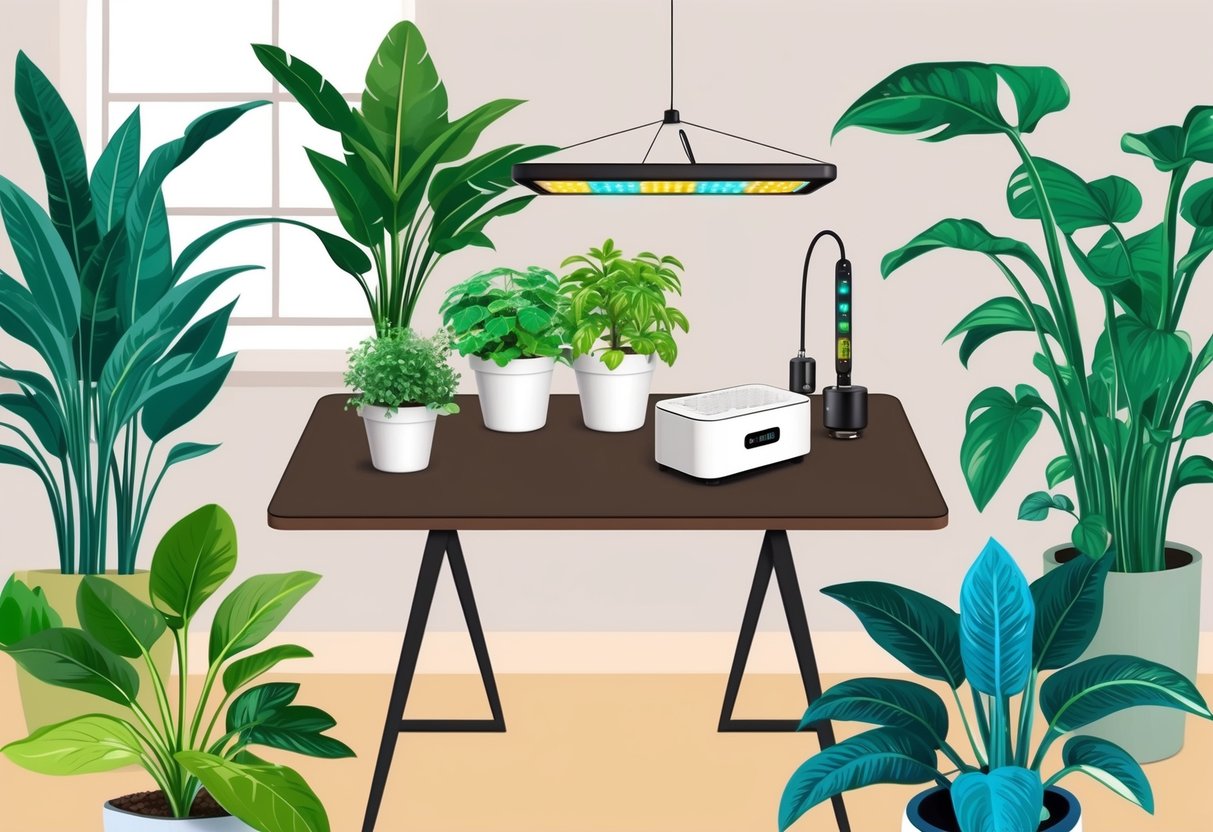
Smart Fertilizer and Nutrient Dispensers
Smart dispensers automate fertilizer distribution, improve nutrient uptake, and make maintaining soil health less labor-intensive. Automated systems and advanced monitoring ensure efficient plant care by targeting the right quantity and type of nutrients at the right times.
Automated Feeding Systems
Automated feeding systems deliver fertilizers and nutrients at scheduled intervals, taking the guesswork out of plant care. These units use sensors to monitor soil conditions such as moisture, pH, and temperature, then adjust feeding routines as needed.
Many devices can be programmed or linked to a smart gardening hub for remote adjustments. Key benefits include consistent plant nourishment, reduced resource waste, and minimized risk of under or over-fertilizing.
Users can also track feeding history and system performance through smartphone apps. Some smart dispensers, like the Smart Fertilizer Dispenser, have demonstrated a measurable increase in crop yields by delivering precise nutrient doses.
Automated systems are compatible with both indoor and outdoor gardens. Installers should consider compatibility with their preferred nutrients and ensure the device can handle various fertilizer types, such as liquid, granular, or slow-release formats.
Balancing Nutrients for Healthier Plants
Balanced nutrition is essential for robust plant health, disease resistance, and maximum yield. Smart dispensers help maintain this balance by leveraging real-time soil data and customized feeding programs.
These devices prevent common issues like nutrient lockout or buildup by adjusting quantities and timing based on actual plant and soil needs. Gardeners benefit from dashboards and notifications that alert them to nutrient deficiencies or imbalances.
Many systems allow users to select specific nutrient mixes, supporting tailored plant care for species with unique requirements. Integration with weather monitoring tools and plant health sensors further refines nutrient application, ensuring that plants receive optimal feeding under a variety of conditions.
Some smart dispensers even offer predictive maintenance and alerts for replenishing supplies, streamlining the process for gardeners seeking efficiency and consistency in their plant care routine.
Top Tools for Indoor Gardening Success
Indoor gardening thrives when reliable, technology-driven tools simplify plant care and boost healthy growth. The right smart garden system and seed kit can ensure optimal light, nutrients, and convenience for every skill level.
AeroGarden and Its Advantages
The AeroGarden stands out as a prominent indoor gardening system designed to make plant growing easier and more consistent. By combining automated LED grow lighting, self-watering features, and digital reminders, this smart garden manages essential growing conditions with minimal effort.
Its hydroponic method eliminates soil mess and accelerates root development. Multiple AeroGarden models accommodate different growing capacities, from compact kitchen-friendly systems to larger harvest designs.
The integrated touch controls offer precise settings for light cycles and reminders to add water or nutrients. With these innovations, even beginners find success cultivating herbs, vegetables, and flowers indoors throughout the year.
CNET recommends AeroGarden as a top indoor smart garden, highlighting its user-friendly controls and effective results for apartment dwellers or anyone limited by space (see best indoor-garden kits).
Customizable Seed Kits
Customizable seed kits are a core feature of modern indoor gardening solutions, including AeroGarden systems. These kits usually come with pre-seeded pods or sponges containing options such as basil, tomatoes, lettuces, and even flowers.
Each pod is formulated for root growth and easy transplanting. A major benefit is the ability to select seed varieties tailored to specific preferences or growing conditions.
Organic and non-GMO options are widely available, and refills can be purchased separately to refresh or rotate crops. This flexibility allows gardeners to experiment with uncommon or heirloom seeds not easily found at local stores.
With a well-matched seed kit, care is further simplified: pods often include fertilizer, deliver fast germination, and reduce the risks of disease or pest problems common to soil. For both new and experienced indoor gardeners, customizable seed kits make it easier to plan diverse, thriving home harvests year-round.
Plant Health Monitoring Devices
Smart plant health monitoring devices help ensure optimal growing conditions and reduce unnecessary maintenance. By providing real-time data on factors like soil moisture, pH, and environmental conditions, these tools allow gardeners to make informed adjustments for healthier plants.
Moisture and pH Sensors
Modern moisture and pH sensors provide accurate readings that help gardeners know exactly when and how much to water or adjust soil conditions. These devices measure the water content in the soil, preventing both overwatering and underwatering—two of the most common causes of poor plant health.
Many advanced models also monitor soil pH, which is crucial for nutrient uptake and overall plant vigor. A clear display or connected app displays real-time data, making it easy to spot imbalances.
Tools such as the soil moisture meter and pH testers are highly valued by both home gardeners and commercial growers for precise plant care. Some sensors can be left in the soil long-term for continuous monitoring, while others are designed for handheld spot-checking.
This prevents guesswork and can significantly improve plant maintenance routines by catching issues early.